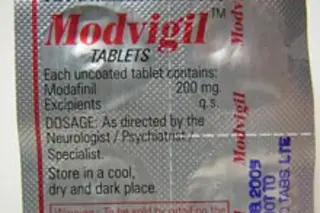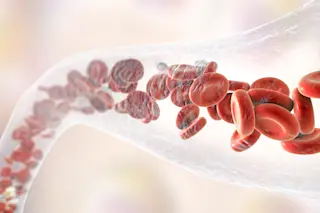Modafinil, a drug officially approved to treat narcolepsy but increasingly used off-label to improve cognitive performance, has been shown to carry a greater risk of addiction than was previously thought. Brain scans of 10 healthy men taking Provigil, the version of modafinil made by the pharmaceutical company Cephalon, showed increased levels of dopamine in the part of the brain involved in pleasure and addiction. Dopamine is a neurotransmitter, a chemical that carries messages from nerve cell to nerve cell or other tissues. Drugs that increase dopamine have the potential for abuse [USA Today]. The demonstrated effect is similar to that known to accompany classically addictive stimulants, and federal health officials hope that the findings will serve as a warning that modafinil may have unexpected and tragic consequences for people who use it simply for a brain boost [LA Times]. Modafinil has been on the market since 1999, but off-label use has been on the rise by healthy people who believe it will boost their mental performance. It was thought to be safer than other stimulant drugs, because scientists believed it did not affect the brain’s dopamine system. This small new study, published in the Journal of the American Medical Association, is the first human evidence that a typical dose of modafinil affects dopamine in the brain as much as a dose of Ritalin, a controlled substance with clear potential for dependence [AP]. With almost $1 billion in sales last year, Provigil is Cephalon’s biggest-selling product, and a longer-acting version called Nuvigil, known as armodafinil, is scheduled to be sold beginning in the third quarter of 2009 [Bloomberg]. Lead researcher Nora Volkow said, "It would be wonderful if one could take a drug and be smarter, faster or have more energy. But that is like fairy tales. We currently have nothing that has those benefits without side effects" [AP]. And the research has led to concessions by some scientists who argue that people should have the right to boost their brains with medications if they so choose. Brain scientist Martha Farah said the new study "goes to show that we need a little caution and a little humility when we're messing around with our brain chemistry" [AP]. Related Content: 80beats: Prescribe Ritalin to Everyone, Provocative Essay Suggests DISCOVER: What Breaks Down the Asleep/Awake Divide? Narcolepsy may be caused by the body attacking part of the brain.
Image: Flickr / {Guerrilla Futures | Jason Tester}














